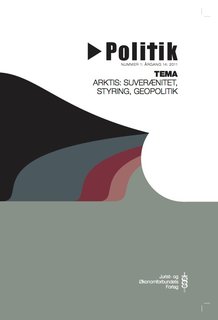Geopolitik, naturlige grænser og „kartopolitik“ i Arktis
DOI:
https://doi.org/10.7146/politik.v14i1.27474Resumé
Drawing on insights from Critical Geopolitics and the science studies of Bruno Latour, this article argues that geopolitics in the Arctic today is not only a question of interstate competition but also a struggle about how to define space. If we challenge the notion of geography as being something given or natural, geographical space itself becomes a contested phenomenon. With such a perspective, it appears that there is a more profound geopolitical struggle taking place between indigenous people, represented in this article by the Inuit Circumpolar Council, and states, than there is between states. I introduce the term ‘cartopolitics’ to describe the way in which cartography and measurement establish a particular spatial reality that is necessary for international law to function in relation to sovereignty claims made by Arctic states. In contrast to this scientific rationality of space, the Inuit have laid claim to a different spatiality characterized by shared use and movement across ice. By implication we must recognise this contest over spatiality as a geopolitical struggle that is as important for life in the Arctic as the one that takes place between states only.
Downloads
Publiceret
Citation/Eksport
Nummer
Sektion
Licens
Forfattere, der publicerer deres værker via dette tidsskrift, accepterer følgende vilkår:
- Forfattere bevarer deres ophavsret og giver tidsskriftet ret til første publicering, samtidigt med at værket er omfattet af en Creative Commons Attribution-licens, der giver andre ret til at dele værket med en anerkendelse af værkets forfatter og første publicering i nærværende tidsskrift.
- Forfattere kan indgå flere separate kontraktlige aftaler om ikke-eksklusiv distribution af tidsskriftets publicerede version af værket (f.eks. sende det til et institutionslager eller udgive det i en bog), med en anerkendelse af værkets første publicering i nærværende tidsskrift.
- Forfattere har ret til og opfordres til at publicere deres værker online (f.eks. i institutionslagre eller på deres websted) forud for og under manuskriptprocessen, da dette kan føre til produktive udvekslinger, samt tidligere og større citater fra publicerede værker (se The Effect of Open Access).

